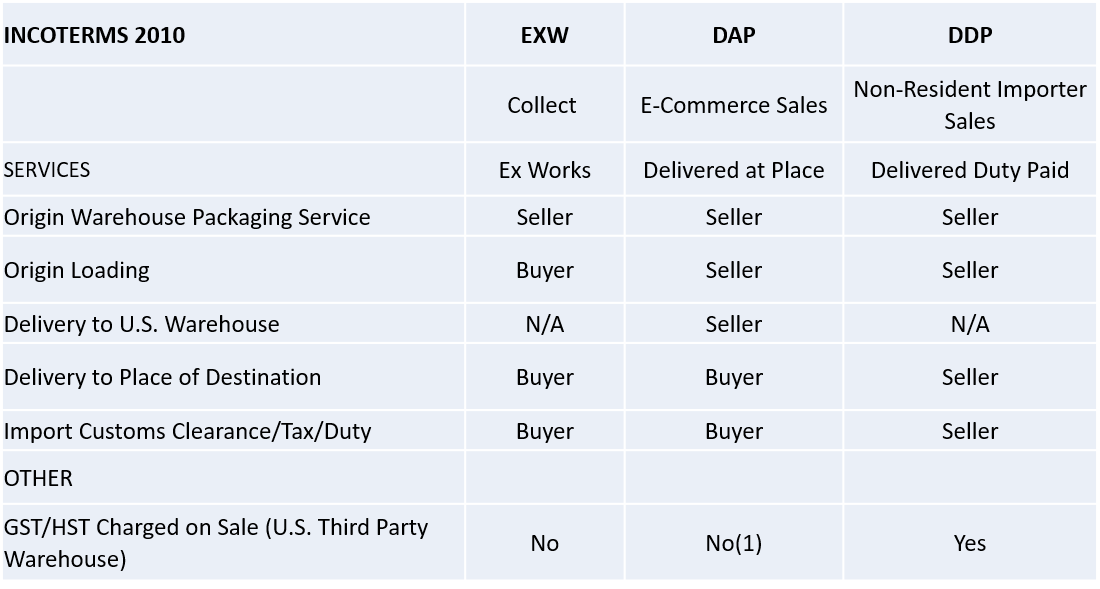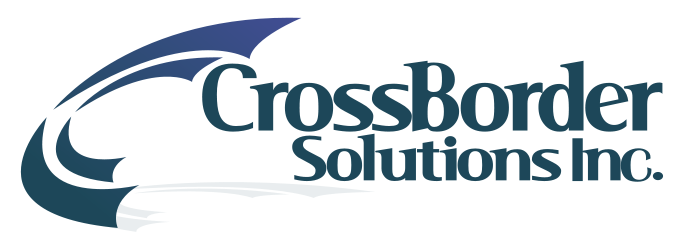
If DAP and shipped direct to Canadian customer, GST/HST would be charged on sale.
Prepaid Freight – Shipped to U.S. 3rd party warehouse
(a) if yes—> DAP – GST/HST Exempt
or
(b) if no —> DDP – Duty, GST/HST, Brokerage and freight are included in the selling price
INCOTERMS 2010: Expanded Summary
EXW – EX WORKS
The buyer bears all costs and risks involved in taking the goods from the seller’s premises to the desired destination. The seller’s obligation is to make the goods available at his premises (works, factory, or warehouse). This term represents minimum obligation for the seller. This term can be used across all modes of transport.
DAP – Delivered at Place
Seller delivers the goods when they are placed at the disposal of the buyer on the arriving means of transport ready for unloading at the named place of destination. Parties are advised to specify as clearly as possible the point within the agreed place of destination, because risks transfer at this point from seller to buyer. If the seller is responsible for clearing the goods, paying duties etc., consideration should be given to using the DDP term.
Responsibilities
- Seller bears the responsibility and risks to deliver the goods to the named place ie. 3rd party warehouse in the U.S.
- Seller is advised to obtain contracts of carriage that match the contract of sale
- If the seller incurs unloading costs at place of destination, unless previously agreed they are not entitled to recover any such costs
- Importer (buyer) is responsible for effecting customs clearance, paying any customs duties and taxes and arranging the transportation of the goods from the 3rd party warehouse to their desired destination in Canada
DDP – Delivered Duty Paid
The seller is responsible for delivering the goods to the named place in the country of importation, including all costs and risks in bringing the goods to import destination. This includes duties, taxes and customs formalities. This term may be used irrespective of the mode of transport.
The Incoterms® rules have become an essential part of the daily language of trade. They have been incorporated in contracts for the sale of goods worldwide and provide rules and guidance to importers, exporters, lawyers, transporters, insurers and students of international trade.
Below are short descriptions of the 11 rules from the Incoterms® 2010 edition
RULES FOR ANY MODE OR MODES OF TRANSPORT
EXW Ex Works
“Ex Works” means that the seller delivers when it places the goods at the disposal of the buyer at the seller’s premises or at another named place (i.e.,works, factory, warehouse, etc.). The seller does not need to load the goods on any collecting vehicle, nor does it need to clear the goods for export, where such clearance is applicable.
FCA Free Carrier
“Free Carrier” means that the seller delivers the goods to the carrier or another person nominated by the buyer at the seller’s premises or another named place. The parties are well advised to specify as clearly as possible the point within the named place of delivery, as the risk passes to the buyer at that point.
CPT Carriage Paid To
“Carriage Paid To” means that the seller delivers the goods to the carrier or another person nominated by the seller at an agreed place (if any such place is agreed between parties) and that the seller must contract for and pay the costs of carriage necessary to bring the goods to the named place of destination.
CIP Carriage And Insurance Paid To
“Carriage and Insurance Paid to” means that the seller delivers the goods to the carrier or another person nominated by the seller at an agreed place (if any such place is agreed between parties) and that the seller must contract for and pay the costs of carriage necessary to bring the goods to the named place of destination. ‘The seller also contracts for insurance cover against the buyer’s risk of loss of or damage to the goods during the carriage. The buyer should note that under CIP the seller is required to obtain insurance only on minimum cover. Should the buyer wish to have more insurance protection, it will need either to agree as much expressly with the seller or to make its own extra insurance arrangements.”
DAT Delivered At Terminal
“Delivered at Terminal” means that the seller delivers when the goods, once unloaded from the arriving means of transport, are placed at the disposal of the buyer at a named terminal at the named port or place of destination. “Terminal” includes a place, whether covered or not, such as a quay, warehouse, container yard or road, rail or air cargo terminal. The seller bears all risks involved in bringing the goods to and unloading them at the terminal at the named port or place of destination.
DAP Delivered At Place
“Delivered at Place” means that the seller delivers when the goods are placed at the disposal of the buyer on the arriving means of transport ready for unloading at the named place of destination. The seller bears all risks involved in bringing the goods to the named place.
DDP Delivered Duty Paid
“Delivered Duty Paid” means that the seller delivers the goods when the goods are placed at the disposal of the buyer, cleared for import on the arriving means of transport ready for unloading at the named place of destination. The seller bears all the costs and risks involved in bringing the goods to the place of destination and has an obligation to clear the goods not only for export but also for import, to pay any duty for both export and import and to carry out all customs formalities
RULES FOR OCEAN TRANSPORT
FAS Free Alongside Ship
“Free Alongside Ship” means that the seller delivers when the goods are placed alongside the vessel (e.g., on a quay or a barge) nominated by the buyer at the named port of shipment. The risk of loss of or damage to the goods passes when the goods are alongside the ship, and the buyer bears all costs from that moment onwards.
FOB Free On Board
“Free On Board” means that the seller delivers the goods on board the vessel nominated by the buyer at the named port of shipment or procures the goods already so delivered. The risk of loss of or damage to the goods passes when the goods are on board the vessel, and the buyer bears all costs from that moment onwards.
CFR Cost and Freight
“Cost and Freight” means that the seller delivers the goods on board the vessel or procures the goods already so delivered. The risk of loss of or damage to the goods passes when the goods are on board the vessel. the seller must contract for and pay the costs and freight necessary to bring the goods to the named port of destination.
CIF Cost, Insurance and Freight
“Cost, Insurance and Freight” means that the seller delivers the goods on board the vessel or procures the goods already so delivered. The risk of loss of or damage to the goods passes when the goods are on board the vessel. The seller must contract for and pay the costs and freight necessary to bring the goods to the named port of destination.
‘The seller also contracts for insurance cover against the buyer’s risk of loss of or damage to the goods during the carriage. The buyer should note that under CIF the seller is required to obtain insurance only on minimum cover. Should the buyer wish to have more insurance protection, it will need either to agree as much expressly with the seller or to make its own extra insurance arrangements.”
